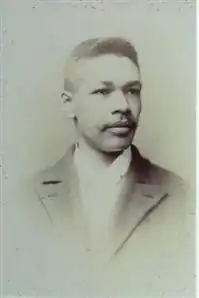
Nathaniel J. Sargent (July 4, 1863 – August 16, 1954) was a Black pioneer in Washington who settled in Kitsap County.
Life
Sargent was born into slavery in Kentucky on July 4, 1863.[1][2][3] After being freed, he was raised by a white family and attended the University of Illinois. Sargent moved to Kitsap County, Washington in 1882, making money as a lumberjack and a rancher.[2][4] He had initially intended to homestead in Oregon, but the state's Jim Crow laws prevented him from doing so.[5]
In 1894 or 1897, Sargent was elected Justice of the Peace for Seabeck.[1][2] Over the course of his life, Sargent built up a 248-acre ranch, eventually giving some of the land away to found a school.[6]
He died on August 16, 1954, after several years in the hospital.[1][3] He was buried in the Seabeck Cemetery. His grave was unmarked for many years, with a headstone only being added sometime in the 2010s.[7][8]
Legacy
On October 27, 2022, the Washington State Committee on Geographic Names renamed a lake north of Tahuya "Nathaniel Sargent Lake" in his honor. The body of water had been known by the derogatory name "Negro Slough" through the 1990s, later being renamed "Grass Lake."[9][10] The change was finalized by the Washington State Department of Natural Resources on January 19, 2023, along with changes to several other geographic features to remove references to racial slurs.[11] The formal renaming took place on February 9, 2023.[12]
See also
References
- 1 2 3 Nelson, David (January 23, 2023). "Recognition for Black pioneers Nathaniel Sargent, Rodney White moves forward at state level". Kitsap Sun. Retrieved February 19, 2023.
- 1 2 3 "Sargent, Nathaniel". Notable Kentucky African Americans Database. Retrieved February 19, 2023.
- 1 2 "Resident 72 Years In Area, Beloved Negro Man, Dies". Kitsap Sun. Bremerton, Washington. August 17, 1954. p. 2. Retrieved February 20, 2023 – via Newspapers.com.
- ↑ Perry, Fredi (February 29, 1988). "Some blacks were prominent in Kitsap". Kitsap Sun. p. 3. Retrieved February 22, 2023 – via Newspapers.com.
- ↑ Blair Jr., Seabury (February 24, 1984). "Kitsap's black pioneers are being remembered". The Kitsap Sun. p. 11. Retrieved February 22, 2023 – via Newspapers.com.
- ↑ Smith, Roosevelt (February 2, 2022). "Black History Month: The early Black pioneers of Kitsap County". Kitsap Sun. Retrieved February 22, 2023.
- ↑ Binion, Andrew (July 16, 2010). "Seabeck Cemetery: Buried in the brush". Kitsap Daily News. Retrieved February 22, 2023.
- ↑ Farley, Josh (August 5, 2022). "A Tahuya slough, once named for the N-word, was farmed by Black pioneer born into slavery". Kitsap Sun. Retrieved February 22, 2023.
- ↑ Rodruck, Ryan (October 27, 2022). "Committee on Geographic Names Approves Tribal Proposals for Renaming Derogatory Place Names". Washington State Department of Natural Resources. Retrieved October 31, 2022.
- ↑ Weeks, Gordon (November 3, 2022). "Relabeling racist names on Tahuya lakes". Shelton-Mason County Journal. Retrieved February 16, 2023.
- ↑ Dallas, Julia (February 7, 2023). "Washington wetlands are renamed to honor Black, Indigenous history". KIRO7. Retrieved February 16, 2023.
- ↑ Nelson, David (February 9, 2023). "Final approval granted for renaming Mason County sites for Black pioneers". Kitsap Sun. Retrieved May 16, 2023.
External links
- Nathaniel Sargent in the Notable Kentucky African Americans Database